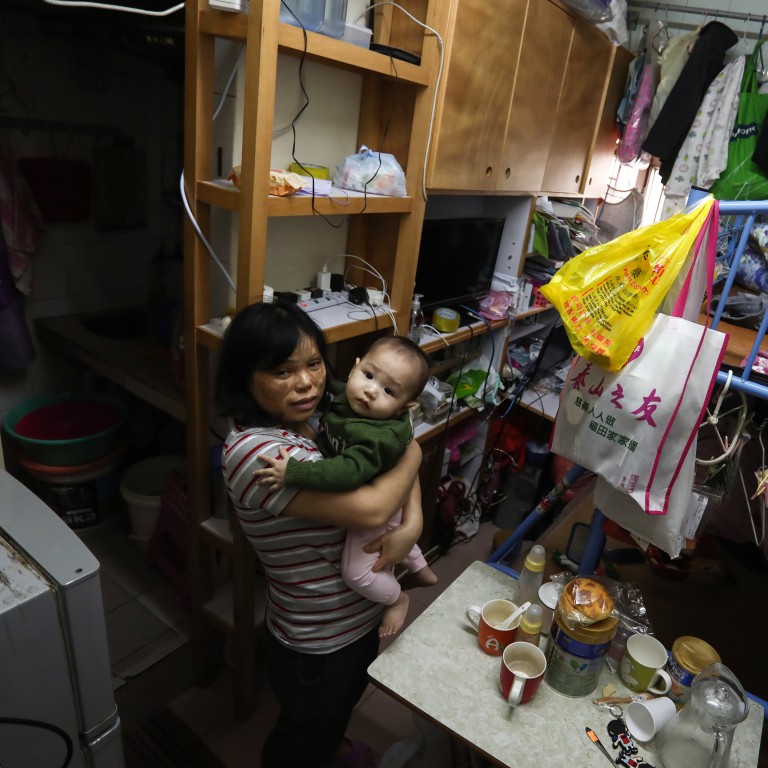
Hong Kong’s subdivided flat tenants welcome task force call to keep rents under control, but are not sure how the system will work
- Many tenants also believe rent increase of no more than 15 per cent is still too high
- Concern group member Kenny Ng says consumer price index could be used as a reference for pegging rent rise
Tenants of Hong Kong’s subdivided flats have welcomed the idea of keeping their rent levels under control, but said they struggle to understand how the mechanism will work and feel a maximum rent increase of 15 per cent is too high.
Housewife Ho Mei-ying, 34, lives with her family of four in a 100 sq ft subdivided flat on the eighth floor of a walk-up building in Cheung Sha Wan. They currently pay HK$4,100 (US$527) per month, including HK$3,400 in rent and about HK$700 for utilities.
The four sleep on a bunk bed that takes up most of the flat. Ho cooks vegetables and congee just three steps away from the toilet.
Hong Kong task force on subdivided flats recommends tying rent increases to market index
According to Ho, the landlord said her family had been given a HK$100 rent discount last October, but they still had to pay more each month because of increases in their utility bill. “The landlords are very clever, they just raise the water and electricity fees to cover the ‘discount’ and earn more money,” Ho said.
She welcomed the recommendations of a government-appointed task force to mandate a standard tenancy agreement.
The task force’s report, released on Wednesday, suggests that to keep rents in check under the future legislation, subdivided flats should be brought under rent control arrangements tied to an existing official index that reflects the general residential market. It also suggests raises be capped at 15 per cent.
The report says that tenants should only need to pay the rent, deposit, utility charges and fees for any breaches, and nothing else. If no individual electricity or water meter is installed, the landlord will need to provide a copy of the utility bill and a breakdown of the apportionment among the tenants of the flat.
“This is a good thing. This will help prevent the landlord from overcharging me for utilities,” said Ho, who has been waiting for a flat in public housing for five years.

She struggled to understand how the index could help keep the rents in check, but she found the 15 per cent cap too high.
“A few hundred dollars is already a lot, that’s the money I spend on groceries and things for my baby. We don’t have much savings, so we’re just taking one step at a time.”
For tenants like 43-year-old cleaner Wong, who earns around HK$10,000 a month, a maximum of 15 per cent increase is not ideal. She currently pays about HK$4,000 a month for her 80 sq ft apartment.
“For us, the cheaper the rent the better … But a maximum 15 per cent increase is too high and not acceptable,” she said.
She also hoped there would be more avenues for tenants to complain if they felt landlords were taking advantage of their situation.
Wong lives alone in a subdivided flat in Kwai Chung after her divorce, while her ex-husband and daughters aged 14 and 10 live in a public housing flat in Sha Tin. She said she had met a number of unreasonable landlords while living as a tenant.
She recalled that a landlord had increased her monthly rent from HK$3,300 to HK$5,000, a 51.5 per cent rise, over three to four years.
“They will say they don’t care if you die or jump off the building, they just want to collect the rent. Otherwise, they will threaten you to move out,” she said.
Fears Hong Kong’s subdivided flat rents will rise before tenancy law kicks in
Kenny Ng, a member of concern group Kwai Chung Subdivided Flat Residents Alliance, said pegging rent rise to the rental index by the Rating and Valuation Department, which covers residential properties of all sizes, was still too high.
“Unfortunately it is not accurate enough to effectively reflect the current situation of subdivided housing. Salaries are much lower than the rent increase,” he said.
The group believed the consumer price index, which is widely used as an indicator of how inflation affects customers, could be used as a reference, and suggested a 3 to 8 per cent increase.
The task force has found in its survey that 63 per cent of the city’s subdivided households live in flats sized below 13 square metres (140 square feet). The median monthly income of households living in these flats was HK$15,000 in 2020, and the median monthly rental of a subdivided flat was HK$4,800.
Rent control proposal for Hong Kong’s smallest homes could consider inflation
However, property agents such as Ken, who wished to be known by his first name, said they believed the task force’s rent increase suggestions might harm the landlords and hurt Hong Kong’s reputation as a free market.
“When the market is good, the rents can increase. But when it’s not good, for example during the pandemic, there are landlords who decrease the rents,” Ken said.
He added that landlords also had their own financial pressures as they had to pay management and maintenance fees. “Many landlords won’t think it’s fair,” he said.



